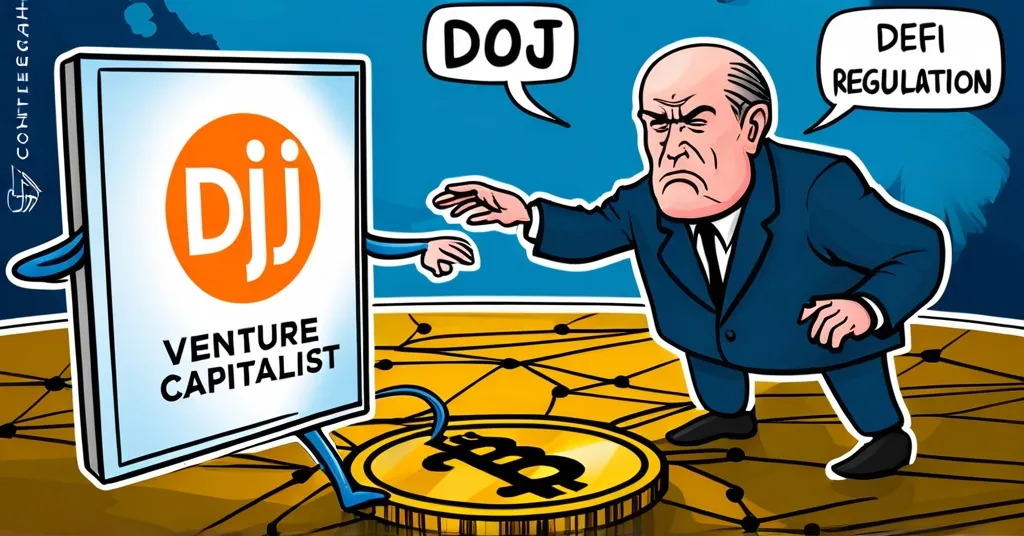a16z Slams DOJ’s DeFi Prosecution, Hopes for Crypto-Friendly Trump Era

a16z Challenges DOJ’s Approach to DeFi Regulation Amidst Crypto-Friendly Trump Policies
Andreessen Horowitz (a16z), a leading venture capital firm, has taken a strong stance against the U.S. Department of Justice’s (DOJ) approach to prosecuting decentralized finance (DeFi) protocols. DeFi, or Decentralized Finance, refers to financial services provided on public blockchains without traditional intermediaries like banks. a16z argues that developers should not be held accountable for actions taken by users on these platforms, sparking a crucial debate on the nature of control and responsibility within the DeFi ecosystem.
- a16z criticizes DOJ’s approach to DeFi.
- Calls for clearer legal definition of “control”.
- Hopes for crypto-friendly Trump administration.
a16z’s critique is a direct response to the DOJ’s tendency to prosecute blockchain developers for actions taken by users on their platforms. The firm likens this to holding car manufacturers responsible for accidents caused by drivers, a comparison that underscores the absurdity of such legal actions. “Unfortunately, the Department of Justice (DOJ) has ignored this distinction and is attempting to do just that by holding software developers responsible for the actions of third parties that use neutral tools the developers created but no longer control,” a16z stated.
This issue gained prominence with cases like United States v. Storm and Rodriguez, where the DOJ treated developers as unlicensed money transmitters. In simpler terms, this means the DOJ charged developers as if they were operating a money transfer service without a license, despite the fact that they have no control over the software once it’s deployed on the blockchain. This case exemplifies the challenges faced by the DeFi community, as developers typically relinquish control over their software once it’s deployed.
In the context of DeFi, “control” means the ability to alter or influence the operation of the software. Once developers deploy their code on a blockchain, they cannot modify its operation, which starkly contrasts with traditional software where developers can update or change programs at will. a16z, with its extensive portfolio of over 100 crypto companies including Uniswap, is not just a critic but a significant player in the crypto space. The firm’s vested interest in regulatory clarity is evident as they call for a clearer legal definition of “control” to differentiate between the responsibilities of developers and users.
This request for legal clarity is particularly poignant given the regulatory environment under former President Joe Biden, where federal agencies like the Securities and Exchange Commission (SEC) opened over 100 cases against crypto entities. The SEC’s actions under Biden were seen as stringent, creating a challenging environment for the crypto industry.
Looking ahead, there’s a glimmer of hope for the crypto industry with the incoming Trump administration. President Trump has promised to make the U.S. a leader in the crypto industry, signaling a potential shift towards more crypto-friendly policies. This includes appointing crypto-friendly leadership at the SEC and reversing policies like the SEC’s Staff Accounting Bulletin 121 (SAB 121), which had restricted banks from offering crypto custody services. The Trump administration’s executive order explicitly rescinds Biden’s Executive Order 14067 and Treasury’s Framework for International Engagement on Digital Assets, paving the way for private sector development. This shift could lead to increased investment and innovation, positioning the U.S. as a global leader in the crypto space.
The potential impact of these policy changes extends beyond immediate legal contexts. Clearer legal definitions could encourage more developers to enter the DeFi space, fostering greater innovation and investment. However, while the optimism around a crypto-friendly administration is palpable, it’s essential to remain realistic. The challenges of regulatory compliance and the potential for misuse of DeFi platforms remain significant hurdles. Nevertheless, the push for clearer definitions and a more accommodating regulatory stance could foster a more vibrant and responsible crypto ecosystem.
Amidst these developments, a16z’s call for a more nuanced understanding of control in DeFi reflects broader concerns about regulatory overreach. As the industry evolves, the distinction between developers and users becomes crucial, especially in a sector that champions decentralization and freedom. But let’s not forget, the road to regulatory clarity is often bumpy, and while a16z is pushing for change, some might argue developers should still shoulder some responsibility for the use of their platforms, even if they don’t have direct control. It’s a delicate balance between fostering innovation and ensuring accountability.
As we navigate this complex landscape, it’s clear that the future of DeFi and the broader crypto industry hinges on striking the right balance between innovation and regulation. With a16z leading the charge, the call for clarity and fairness in legal frameworks is more critical than ever. And let’s not kid ourselves, if the DOJ doesn’t rethink its approach, they might just scare off the very innovators that could propel the U.S. to the forefront of the global crypto race.
Key Takeaways and Questions
- What is a16z’s stance on the DOJ’s approach to DeFi protocols?
a16z believes the DOJ should stop prosecuting DeFi protocols for actions taken by users, as developers lack control over these actions.
- How does a16z compare the responsibility of DeFi developers to another industry?
a16z compares it to holding car manufacturers responsible for accidents caused by drivers, highlighting the absurdity of holding developers accountable for user actions.
- What specific legal clarification does a16z call for?
a16z calls for a clearer legal definition of “control” to differentiate between the responsibilities of developers and users in DeFi.
- What is the significance of the United States v. Storm and Rodriguez case?
It exemplifies the DOJ’s approach to prosecuting blockchain developers as unlicensed money transmitters, despite developers typically having no direct control over the software post-deployment.
- How has the regulatory environment for cryptocurrencies changed under different U.S. administrations?
Under Biden, federal agencies were strict with crypto cases, while Trump has promised more crypto-friendly policies, including changes in SEC leadership and policy reversals.
- What role does a16z play in the crypto industry?
a16z is a significant player with over 100 crypto companies in its portfolio, advocating for regulatory clarity in DeFi.
- What are the potential impacts of clearer legal definitions in DeFi?
Clearer definitions could encourage more developers to enter the space, fostering innovation and investment, though challenges remain.



